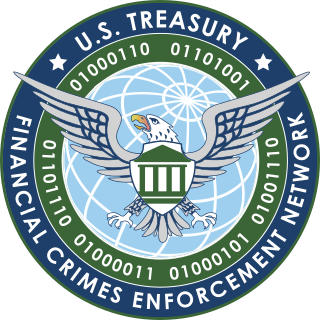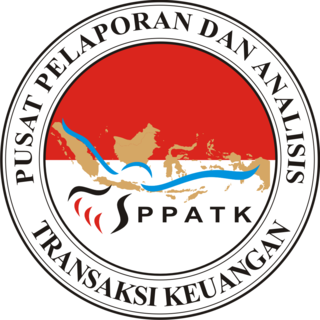Related Research Articles

Money laundering is the process of illegally concealing the origin of money obtained from illicit activities such as drug trafficking, underground sex work, terrorism, corruption, embezzlement, and gambling, and converting the funds into a seemingly legitimate source, usually through a front organization.

The Financial Crimes Enforcement Network (FinCEN) is a bureau within the United States Department of the Treasury that collects and analyzes information about financial transactions to combat domestic and international money laundering, terrorist financing, and other financial crimes.
In financial regulation, a Suspicious Activity Report (SAR) or Suspicious Transaction Report (STR) is a report made by a financial institution about suspicious or potentially suspicious activity as required under laws designed to counter money laundering, financing of terrorism and other financial crimes. The criteria to decide when a report must be made varies from country to country, but generally is any financial transaction that either a) does not make sense to the financial institution; b) is unusual for that particular client; or c) appears to be done only for the purpose of hiding or obfuscating another, separate transaction. The report is filed with that country's Financial Intelligence Unit, which is typically a specialist agency designed to collect and analyse transactions and then report these to relevant law enforcement teams.
The Financial Action Task Force (on Money Laundering) ('FATF, aka "Fatiff"), also known by its French name, Groupe d'action financière (GAFI), is an intergovernmental organisation founded in 1989 on the initiative of the G7 to develop policies to combat money laundering and to maintain certain interest. In 2001, its mandate was expanded to include terrorism financing.

Know your customer (KYC) guidelines and regulations in financial services require professionals to verify the identity, suitability, and risks involved with maintaining a business relationship with a customer. The procedures fit within the broader scope of anti-money laundering (AML) and counter terrorism financing (CTF) regulations.
Australian Transaction Reports and Analysis Centre (AUSTRAC) is an Australian government financial intelligence agency responsible for monitoring financial transactions to identify money laundering, organised crime, tax evasion, welfare fraud and terrorism financing. AUSTRAC was established in 1989 under the Financial Transaction Reports Act 1988. It implements in Australia the recommendations of the Financial Action Task Force on Money Laundering (FATF), which Australia joined in 1990.
The USA PATRIOT Act was passed by the United States Congress in 2001 as a response to the September 11, 2001 attacks. It has ten titles, each containing numerous sections. Title III: International Money Laundering Abatement and Financial Anti-Terrorism Act of 2001 is actually an act of Congress in its own right as well as being a title of the USA PATRIOT Act, and is intended to facilitate the prevention, detection and prosecution of international money laundering and the financing of terrorism. The title's sections primarily amend portions of the Money Laundering Control Act of 1986 and the Bank Secrecy Act of 1970.

Anti-Money Laundering (AML) refers to a set of policies and practices to ensure that financial institutions and other regulated entities prevent, detect, and report financial crime and especially money laundering activities. Anti-Money Laundering is often paired with the action against terrorism financing, or Combating the Financing of Terrorism, using the acronym AML-CFT. In addition arrangements intended to ensure that banks and other relevant firms duly report suspicious transactions, the AML policy framework includes financial intelligence units and relevant law enforcement operations.
Terrorism financing is the provision of funds or providing financial support to individual terrorists or non-state actors.
The USA PATRIOT Act was passed by the United States Congress in 2001 as a response to the September 11 attacks in 2001. It has ten titles, with the third title written to prevent, detect, and prosecute international money laundering and the financing of terrorism.
The Financial Transactions and Reports Analysis Centre of Canada is the national financial intelligence agency of Canada. FINTRAC was established in 2000 under the Proceeds of Crime Act to facilitate detection and investigation of money laundering. Its mandate was expanded in December 2001 following amendments to the Proceeds of Crime Act to also disclose financial intelligence to other Canadian intelligence and law enforcement agencies with respect to suspected terrorist financing. FINTRAC's mandate was further expanded in 2006 under Bill C-25 to enhance the client identification, record-keeping and reporting measures, established a registration regime for money services businesses and foreign exchange dealers, and created new offences for not registering.

The Egmont Group of Financial Intelligence Units is an international organization that facilitates cooperation and intelligence sharing between national financial intelligence units (FIUs) to investigate and prevent money laundering and terrorist financing. National FIUs collect information on suspicious or unusual financial activity and are responsible for processing and analyzing the information received. FIUs are normally not law enforcement agencies themselves, findings are shared with appropriate law enforcement or prosecution bodies if sufficient evidence of unlawful activity is found. The Egmont Group is headquartered in Ottawa, Ontario, Canada.
A financial intelligence unit (FIU) is a national body or government agency or international organization which collect information on suspicious or unusual financial activity from the financial industry and other entities or professions required to report suspicious transactions, suspected of being money laundering or terrorism financing.
Anti-money laundering (AML) software is software used in the finance and legal industries to help companies comply with the legal requirements for financial institutions and other regulated entities to prevent or report money laundering activities. AML software can facilitate faster and more accurate compliance and investigations.

The Financial Monitoring Unit is the Financial Intelligence Unit (FIU) of Pakistan established under the provisions of Anti-Money Laundering Act, 2010. It is an independent intelligence service department of the Government of Pakistan and primarily responsible for analyzing transactions, money laundering cases, building efforts against the terrorist financing, and all sorts of financial crimes within the jurisdiction of financial laws of Pakistan.
The Garda National Economic Crime Bureau – informally known as the Fraud Squad – is a specialised division of Ireland's national police force, the Garda Síochána, that investigates economic crimes. The Bureau operates as part of the Garda Special Crime Operations branch and works alongside other sections of the force, as well as the external Office of the Director of Corporate Enforcement (ODCE), an agency tasked with investigating white-collar crime. The Economic Crime Bureau is responsible for the investigation of serious financial fraud and corruption. It was established in April 1996 and is based at Harcourt Square, Dublin 2. The GNECB is headed by an officer of Detective Chief Superintendent rank, who reports to the Assistant Commissioner of Special Crime Operations.
The Qatar Financial Information Unit (QFIU) is a Qatari government regulatory agency responsible for financial intelligence efforts to combat money laundering and financing of terrorism. Like other national Financial Intelligence Units (FIU) around the world, it requires banks, investment companies, insurers and other financial institutions to report suspicious financial transactions. QFIU then analyzes the information and disseminates the relevant data to law enforcement authorities for further investigation and action.

The Indonesian Financial Transaction Reports and Analysis Center or INTRAC or PPATK is a government agency of Indonesia responsible for financial intelligence. The agency was formed in 2002 to prevent and eradicate suspected illicit financial flows as money laundering and provide information on terrorist financing.
The Financial Reporting Center (FRC) in Somalia was established by the Anti-Money Laundering and Countering the Financing of Terrorism Act, 2016 to operate as a National Central Agency that is responsible for the receipt, analysis and appropriate dissemination of all information relating to money-laundering and terrorism financing.
The FRC serves as Somalia's Financial Intelligence Unit (FIU), an independent center of expertise in the analysis of suspicious financial activity and the investigation of financial crimes.
Emmanuel Omale, is a Nigerian charismatic pastor and televangelist. He is the leader and founder of Divine Hand of God Prophetic Ministry, a Christian church that runs the Divine Hand Television station from Abuja.
References
- ↑ Sanni, Kunle (2022-11-30). "NFIU receives report on N150trn 'suspicious' transactions in three months". Premium Times Nigeria. Retrieved 2023-02-03.
- ↑ "NFIU Unveils Fresh Guidelines to Bolster CBN's Cash Withdrawal Policy". www.thisdaylive.com. Retrieved 2023-02-03.
- ↑ However, the NFIU Act 2018, transformed it into an autonomous agency within the CBN. "NFIU and Diplomatic Missions in Nigeria: Municipal Law Vs Exterritoriality in International Law". www.thisdaylive.com. Retrieved 2023-02-03.
- ↑ Sanni, Kunle (2022-11-30). "NFIU receives report on N150trn 'suspicious' transactions in three months". Premium Times Nigeria. Retrieved 2023-02-03.
- ↑ Ejike, Ejike (2023-01-06). "In Renewed Anti-graft War, NFIU Goes After Federal Govt, States, LGs" . Retrieved 2023-02-03.
- ↑ Sanni, Kunle (2023-01-21). "NFIU reacts to governors' criticism of ban on cash withdrawals from govts' accounts". Premium Times Nigeria. Retrieved 2023-02-03.